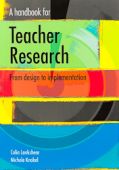
Teacher research is seen as an important means by which teachers can develop their capacity for making the kinds of sound autonomous professional judgements and decisions appropriate to their status as professionals. More specific benefits often associated with recognition of professional status include ‘increased power for teachers’, ‘respect for teachers’, ‘greater justice for teachers’, ‘greater confidence and motivation on the part of teachers’, ‘empowerment’ and ‘greater voice’ for teachers (see Fishman and McCarthy 2000: 13-14).
The second generally shared end or purpose of teacher research is that it can contribute demonstrably to improving teaching or instruction. This can happen in different ways. Through their own research teachers may become aware of things they do in their teaching that might result in students learning less than they otherwise could. With this awareness they can make informed changes to try and enhance learning outcomes. Conversely, existing research might identify interventions or approaches that work positively under certain conditions. Teachers in similar contexts to those where research has shown success might then be able to adapt these approaches productively in their own settings. Alternatively, teacher research provides opportunities for teachers to test the effectiveness of interventions they believe could enhance learning outcomes for some or all of their students. Where interventions are successful the teachers who conducted the original research, and others who become aware of it, may be able to implement and adapt these interventions to obtain improved outcomes beyond the original settings. …
Our view of teacher research rejects both aspects of teacher researcher identity associated with the mainstream view.
First, we do not believe that teacher research must be confined to direct or immediate research of classrooms. Although the ultimate point of impact sought from teacher research is on what occurs in classrooms, it does not follow that this end is best served solely through direct empirical study of classrooms. Teachers may learn much of value for informing and guiding their current practice by investigating historical, anthropological, sociological or psychological studies and theoretical work conducted in other places and/or at other times. These could be studies of policy, communities, social class, the work world, non-standard language varieties and so on. Teachers with an interest in relating or interpreting documentary data with a view to forming hypotheses or provisional explanations of practice might gain a great deal from purely philosophical and theoretical discussions of educational issues they consider pertinent to their work. Alternatively, they might generate their own analyses of secondary (other people’s) data that have been collected in contexts similar in important ways to their own, in order to get perspectives for thinking about their own work prior to researching their own settings. (Such data might reflect patterns of educational attainment associated with variables like ethnic or linguistic background, social class, gender, forms of disability, etc.) To confine teacher research to immediate investigation of classroom settings may cut teachers off from opportunities to gain important insights and knowledge they might miss by simply doing one more classroom study.
Second, we disagree that teacher research should be defined in terms of teachers researching their own classrooms. This is not the same concept as that of conducting research pertinent to one’s own professional practice. While the two are related, they are quite distinct. We often get clearer understandings of ourselves and our own practices, beliefs, assumptions, values, opinions, worldviews and the like by encountering ones that are quite different from our own, and that throw our own into relief and provide us with a perspective on them. Indeed, obtaining critical and evaluative distance can be extremely difficult if we stay within the bounds of our familiar discursive contexts and experiences. …
Furthermore, we do not think teacher research must be conducted independently of formal academic involvement. We see no reason why teachers might not enrol in formal academic programmes to conduct research relevant to their own teaching needs and interests. The crucial point is that the purposes or objects of teacher research must flow from the authentic (or felt) questions, issues and concerns of teachers themselves (see Berthoff 1987; Bissex 1987). This is, perhaps, the key point that demarcates teacher research from academic research, contract research and non-practitioner research in general. In teacher research the ways these issues and concerns are addressed must be answerable and responsive to teachers’ own decisions and ideas about what is helpful and relevant.
This is perfectly compatible with formal suggestions, inputs, collaboration and guidance on the part of academic and professional researchers, offered within or outside of formal programme settings. Everything depends on the facts of particular cases about how the relations and obligations of teacher researchers and academics running formal programmes are contracted. Under current conditions academic educationists are increasingly expected to be responsive to ‘client’ demand and to pursue flexibility that is consistent with individual preferences. Hence, the institutional climate is in principle, and very often in practice, perfectly compatible with the ideal of teacher research building on teachers’ own questions, wonderings, hypotheses and concerns.
From this standpoint we identify teacher researchers as ‘classroom practitioners at any level, from preschool to tertiary, who are involved individually or collaboratively in self-motivated and self-generated systematic and informed inquiry undertaken with a view to enhancing their vocation as professional educators’. The idea of enhancing one’s vocation as a professional educator covers ‘internal’ aspects like achieving greater personal satisfaction and a heightened sense of worth, purpose, direction and fulfilment, as well as ‘external’ aspects like improving the effectiveness of one’s teaching practice in significant areas.
Lankshear, Colin and Knobel, Michele. 2004. A Handbook for Teacher Research: From Design to Implementation. Maidenhead, UK: Open University Press. pp. 5-10. || Amazon || WorldCat
